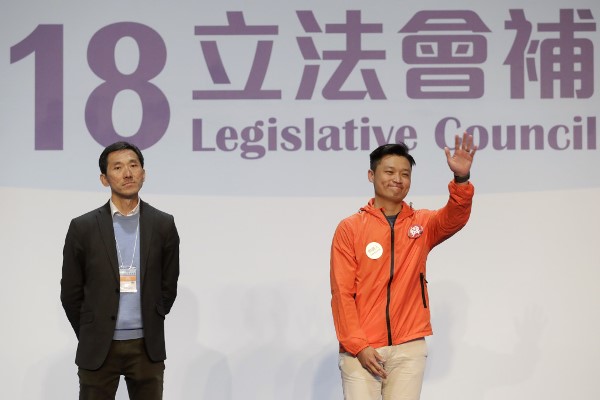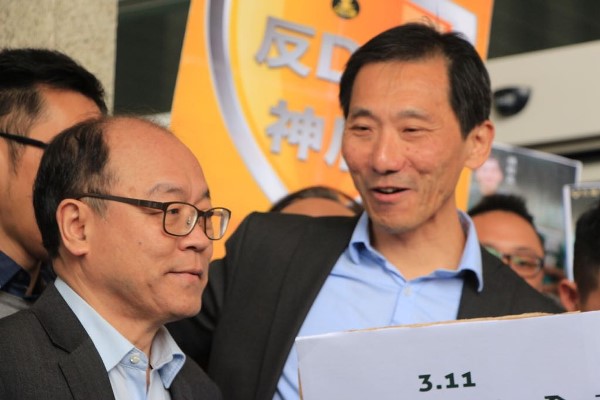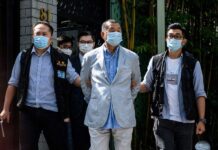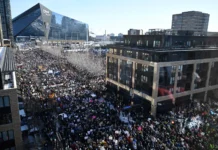Pro-Beijing camp’s exaggerated “victory” celebrations and new undemocratic attacks have to be answered with mass campaign
Jor Yen, Socialist Action (CWI in Hong Kong)
Hong Kong’s pan-democrats suffered a setback in the 11 March Legislative Council (Legco) by-elections, caused by the disqualification of opposition lawmakers, losing the West Kowloon seat which they were expected to regain.
The pro-Beijing camp is predictably in celebratory mode. But do these results really represent the heavy defeat for the opposition they are claiming? Here we analyse what these election results really tell us: Firstly, that the pro-government camp does not – as it ludicrously claims – have a popular “mandate” for the disqualifications and other undemocratic measures. And secondly, that the pan-democrats are paying a price for failing to mobilise mass resistance over the past year, restricting themselves instead to a primarily electoral and legal strategy – of winning back the seats and fighting through the courts. Although these two battlefields are necessary, they are far from “level” or democratic, and increasingly manipulated by the government. A successful counter-strategy must go beyond this.
The pan-democrats recaptured two of the four seats made vacant by the disqualifications last year. The New Territories East constituency was won by Gary Fan Kwok-wai of the Neo Democrats (a split from the Democratic Party). In the Hong Kong Island constituency, another former Democratic Party member Au Nok-hin won the seat, having stepped in as reserve candidate for the banned Agnes Chow of Demosisto, a student-led party (see our report Beijing rigs legislative by-elections).
But in the West Kowloon constituency, Edward Yiu Chung-yim who was chosen to represent the pan-democrats, lost by 2,400 votes (105,060 votes against 107,479) to Vincent Cheng Wing-shun of the right-wing pro-Beijing Democratic Alliance for the Betterment and Progress of Hong Kong (DAB). This was a surprise loss by the pan-democratic camp.
However, the fourth seat contested in the by-elections was the Architectural, Surveying, Planning and Landscape functional constituency – one of 35 ‘small circle’ seats reserved for business and special interest groups. To portray the pan-democrats’ failure to hold onto this seat as a “loss” is absurd; the victory of the establishment’s candidate Tony Tse Wai-chuen over former Civic Party member Paul Zimmerman was entirely expected.
Like the majority of the elitist functional constituencies, which would be abolished under any remotely democratic election system, this seat has always been held by the government camp with the exception of the 2016 Legco election. Because the pro-Beijing camp – unusually – allowed itself to be split in that election, with Tse facing off against another pro-establishment challenger, Yiu was able to achieve a surprise win for the pan-democrats.

Low turnout
The turnout for these by-elections was only 43 percent. This was lower than the 46 percent in the New Territories East by-election in February 2016 and much lower than the 58 percent turnout in the September 2016 Legco election. The government deliberately arranged a low-key election process: the mainstream media did not conduct a single public opinion poll and reduced its overall coverage.
This was a conscious plan to mute and devalue the elections, knowing that a low turnout would benefit the government camp. This followed the banning of three anti-government candidates at the start of the by-election campaigns, another tactic to sow disarray in the opposition camp. Unfortunately, the pan-democratic parties were not capable of countering this with an effective strategy, which requires bold leadership and mass involvement.
They did not make the struggle against authoritarian rule the main topic of these by-elections or sufficiently explain the exceptional character of the current attacks, nor put forward the need for mass struggle as the only way to fight back. Socialist Action has stressed that the by-elections and future electoral battles must be linked to the need to rebuild a mass democracy movement – linking election campaigning to actions, mobilisations and democratic involvement of workers and youth.
How big a setback?
That the pan-democrats, after last year’s monstrously undemocratic disqualifications, could only recapture two of the three geographical Legco seats is undoubtedly a setback for Hong Kong’s democratic movement. The government and pro-Beijing political establishment are boasting that the vote is tantamount to public endorsement of the ‘DQ’ (Legco disqualifications) and banning of radical pro-democracy candidates. Yet even despite the weaker showing of the pan-democrats in these by-elections, their combined vote was 426,000 votes against 391,000 for the pro-Beijing camp – completely refuting the latter’s bombastic claims of majority support for ‘DQ’.
Since the by-elections, the pro-Beijing camp has lost no time in stepping up its attacks on the democracy movement. Wong Kwok-hing of the pro-government Hong Kong Federation of Trade Unions, is masterminding a court action against the victorious pan-democratic candidate Au Nok-hin, claiming that Au, like Agnes Chow who he replaced, should never have been allowed to run because he has previously spoken in favour of “self determination”. (It is not illegal, yet, in Hong Kong to advocate independence or self-determination – another example of how so-called rule of law is being circumvented by the pro-government camp in their ardor to crack down on the democracy movement).
At the same time, Chief Executive Carrie Lam Cheng Yuet-ngor is pushing ahead with the new national anthem law, making “disrespect” an imprisonable offence, even rejecting the traditional practise of holding a public consultation. Such “consultations” were fake, only to give the appearance of a democratic process, but the government now feels it no longer needs to play such games.
Mood of the masses
From this we can conclude that, even if the pan-democrats are suffering from low morale and internal crises after the by-elections, the anger among ordinary people will not be silenced by the by-election setbacks. Instead, public discontent will continue to accumulate and at some point break out, exerting pressure from the bottom up on the pan-democratic leaders and forcing them to take a more fighting stance.
In fact, as a few more astute commentators are warning, these by-election results also contain a serious warning to the government. A significant layer who harbour a burning hatred of the government, especially among working class people and youth, saw no reason to go out and vote in the by-elections, feeling the pan-democratic candidates on offer did not represent their views. This goes beyond that layer, which is not so small, who are attracted to “localism”* (i.e. right-wing Hong Kong nationalism). There is a growing feeling among a layer that the Legco is now a rigged game and the best response is to refuse to play along. In our view this is mistaken, but it is also understandable.
The government is living in a fantasy world if it believes it can strengthen its long-term grip on power by discrediting the Legco, and the Legco election system, something it is doing very effectively with the current repressive measures. It should be remembered, the Legco was set up under the British colonial regime precisely to offer a “safety valve” for mass anger and prevent this anger spilling onto to the streets and seeking more radical channels of struggle.
New Territories East
Although Gary Fan Kwok-wai was successfully elected in New Territories East with over 183,000 votes, this was 40,000 fewer votes than the combined anti-government vote in the 2016 New Territories East by-election (the total vote for the Civic Party’s Alvin Yeung Ngok-kiu and localist pro-independence candidate Edward Leung Tin-kei was 223,000).
The pan-democrats were not able to overcome the establishment pressure for a low voter turnout because they did not link the election struggle to the need to rebuild a mass movement to challenge authoritarian rule. In this way they believed they could win the support of moderate voters. But this only played into the pro-Beijing camp’s hands. It thrives on low-key, “non-political” and behind-the-scenes campaigning, mobilising votes through its vast patronage machinery (various forms of vote buying).
Even the primary system embraced by all the pan-democratic parties and groups to unite behind one candidate in each seat revealed its shortcomings in these elections. Initially, Socialist Action and our candidate Sally Tang Mei-ching participated in the primary (for the West Kowloon seat), but we decided to withdraw after a set of rules was adopted which in our opinion were not fully democratic or conducive to building a really united by-election campaign. Our alternative proposals were outlined in an open letter to the ad hoc primary coordinating body, Power of Democracy.
As we warned, rather that a genuine primary campaign to reach out to the mass of pro-democracy voters and involve them in discussing the political issues and what type of programme was needed to resist the government’s attacks, the primaries became a screen for the main pan-democratic parties to reach a closed-doors agreement over who should stand in which seat.

The loss of West Kowloon
Because Edward Yiu Chung-yim, who won the West Kowloon primary, ran the risk of being disqualified (again), there was a discussion of a ‘Plan B’ candidate among pan-democratic leaders. However, this discussion took place privately between the leaders and over the heads of the voters and even the activist layer. Inevitably, factional rivalries replaced an open and democratic political debate.
This in turn led to a sectarian power struggle between Edward Yiu’s team and supporters of Frederick Fung Kin-kee who came second to Yiu in the pan-democratic primary. Fung represents the Association for Democracy and People’s Livelihood (ADPL), a bastion of the ‘moderate’ pan-democrats, but which has a traditionally strong base in Sham Shui Po, an important mostly working class area of the West Kowloon constituency.
This ‘internal’ conflict contributed to a sense of confusion and even disgust among some traditional pro-democracy voters. It seems to have not only affected traditional ADPL supporters but also the significant layer of young people who hate “politician politics”.
Yiu’s campaign suffered particularly in the public housing estates compared to previous pan-democratic election results. According to a report in Ming Pao, taking West Kowloon as a whole, the voter turnout in the public housing areas fell by about 12 percent compared with the 2016 election results, 7.7 percent in private housing areas, and just 4.2 percent in the middle-class housing estates.
In our opinion this is because Edward Yiu’s campaign unfortunately adopted an elite approach and lacked an economic program in the interests of the working class. To win the support of workers and the poor it is imperative to call for an 8-hour working day, retirement protection for all citizens, a public housing rent freeze, and large-scale public housing construction to be pursued by challenging the economic control of the capitalists in Hong Kong and explicitly opposing the authoritarian government’s collusion with big capital.
Weak organisations
Moreover, this elite approach also led to organisational errors by Yiu’s election team, which relied on methods used in his 2016 election campaign in the Architectural functional constituency seat, and which were completely unsuitable in the West Kowloon election with almost half a million eligible voters (compared to 7,000 in the Architectural FC). Because, as he admitted, Edward Yiu did not have any organisation behind him, his ability to mobilise election workers and conduct publicity campaigns on the streets and in the community was very limited. Instead, his campaign relied too heavily on online propaganda.
This is not only a criticism of Yiu; his campaign is only a stark example of a wider weakness. In general the pan-democratic parties lack a mass-based membership and democratic structures, which limits their ability to reach and involve mass layers. They rely on the media, which the government made sure would be denied them in these by-elections.
Localism and the “scorched earth strategy”
In the last week of the election, localist activists began to advocate a so-called “scorched earth strategy”. Voters were urged not to vote, to cast blank votes, or even to vote for a pro-establishment candidate, as a means to express dissatisfaction with the pan-democrats. Undoubtedly, this could have been an additional factor in the defeat of Edward Yiu.
This is yet another clear example of how the right-wing localist factions put their own interests above the interests of the anti-authoritarian struggle. The high point for Hong Kong’s myriad localist groupings was the 2016 Legco elections when they were able to get around 11 percent of the overall vote and get three legislators elected, two of whom were the first to be disqualified, while the third has undergone a political u-turn and effectively renounced localism. In the face of this increased state repression, including the persecution of many localist activists through the courts, these groups have been incapable due to their lack of organisation of mounting any coherent fight back or mobilising support to defend their positions.
It would be wrong to overestimate the online propaganda power of the localists and their “scorched earth” line in the by-elections. It is rather that there was already a widespread mood of disappointment towards the pan-democrats among youth feeling they had no incentive to vote. The localists simply sensed this existing mood and opportunistically tried to claim the political credit for themselves.
Conclusions
In the aftermath of the by-elections there is no shortage of pessimistic and conservative conclusions being put forward by pan-democratic politicians and scholars. Inevitably and shamefully, some people blame the voters for not caring about the ‘DQ’ incident and repression. They claim the results show that non-political “local work” is the way to win support from the majority of voters. Moreover, some now argue the by-elections represent a breakthrough for the pro-government camp, that they have broken through the traditional “6:4 ratio” (whereby pro-democracy candidates normally garner around 60 percent of the popular vote, while of course only getting a minority of seats because of the functional constituency system). According to these pessimists, support for the democracy movement is in decline.
Socialist Action totally rejects these arguments. This is to shift the responsibility onto the masses for the lack of a fighting alternative offered by the pan-democratic leaders. Based on such false logic, in the next two by-elections** the pro-democracy candidates will come under pressure to further disconnect the election campaign from the mass struggle.
On the contrary, since the disqualification of four legislators in July of last year and the sentencing of young activists to jail, the masses have mobilised on numerous occasions, especially on 20 August, when more than the 100,000 people confounded the expectations of the government and the protest organisers. If there is a clear strategy and fighting leadership, calling to escalate the movement to include strikes and connecting this with the masses in mainland China, this could challenge Xi Jinping’s despotic regime and his Hong Kong puppets.
The next by-election campaign, with no date yet announced, needs to take a very different route and adopt a platform for reconstructing the anti-authoritarian struggle as a mass movement based on the working class and the youth. An anti-authoritarian election campaign should take the interests of the mass struggle as the first step, mobilise the masses with marches and assemblies, and democratically discuss the strategies, ideas, and political program needed to defeat the dictatorship. The election campaign must offer an answer to the livelihood problems of the working class in order to mobilise the broad masses to oppose the capitalist economic system of the government.
Explanatory notes
* Localism is a trend of anti-China nationalism that has grown among young people especially. Right-wing ideas and anti-mainlander racism are dominant influences among localist activists, but as a whole localism is almost entirely an online ‘movement’ lacking any clear programme or organisational form. It has been severely hit by the repressive onslaught of the Chinese regime since the 2016 elections – a turn of events which leading localists had completely failed to foresee.
**The by-elections were caused by the undemocratic disqualification of six opposition Legco members in 2017, two localists and four pro-democracy representatives, as part of Beijing’s increased repression against the democracy movement. Two disqualified legislators, ‘Long Hair’ Leung Kwok-hung and Lau Siu-lai, are challenging their disqualification in the courts. If they lose the case then a further two by-elections will be held.




